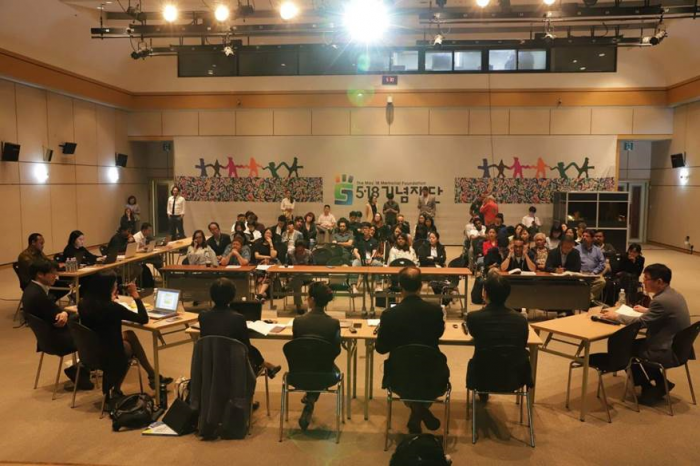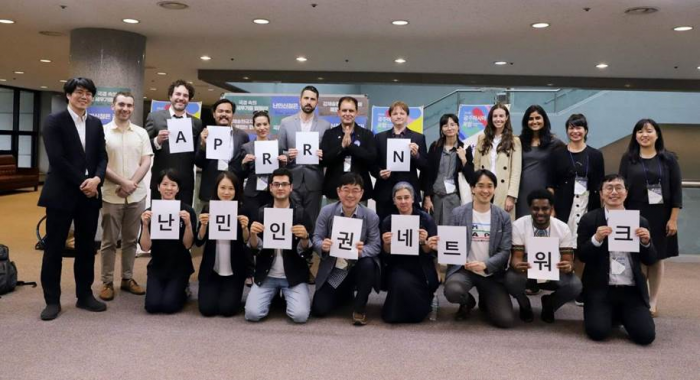난민 | 2019 광주 아시아 포럼
페이지 정보
작성자 재단법인 동천1 작성일19-05-21 11:31 조회1,959회본문
재단법인 동천 이탁건 변호사는 518기념재단에서 주최한 2019 광주 아시아 포럼에 참석하여 “무엇을 할 것인가?” 융합세션에서 “아시아 정부들, 국제기구의 책임과 역할”을 주제로 발제하였습니다.
“학살”과 “난민”을 양 주제로 하여 열린 이번 포럼은 동천을 포함한 난민인권네트워크에서 세션의 기획 단계부터 적극적으로 참여하였습니다. 특히 Asia Pacific Refugee Rights Network(APRRN) 소속 단체 활동가들이 다수 참석하여, 난민 보호와 권리 옹호에 대한 활발한 국제연대의 가능성을 모색할 수 있는 좋은 기회였습니다.

이번 포럼에서는 한국, 일본, 홍콩, 대만, 인도네시아 및 태국 내 난민 법제도 현황과 시민사회의 활동을 공유하고, 개선방향을 논의하였습니다. 난민에 대한 차별과 혐오 정서의 확산에 대한 국가의 실패를 확인하고, 시민사회의 중요성을 재확인하였습니다.
더불어서 이탁건 변호사가 부의장을 맡고 있는APRRN Legal Aid and Advocacy Working Group 실무회의와, East Asia Working Group에서 주관한 각국 난민불인정사유서의 개선방향에 대한 발제도 별도의 Side Event로 열려, 많은 APRRN 활동가들과 함께 하였습니다.
19.5.20. 열린 폐막식에서는 2019 광주선언이 채택되었는데, APRRN 사무국장 Themba Lewis가 낭독한 난민 관련 선언은 다음과 같습니다.
-----------------------------------------------------------
2. 난민 : 난민과 무국적자의 인권을 보호하고 혐오와 차별을 방지하는 정책 수립과 법적 조치를 촉구한다!
현재 국제인권규범에 의한 보호가 필요한 전 세계의 난민과 국내실향민, 무국적자들은 6천8백만명에 달하며 이는 제2차 세계대전 이후 가장 높은 수치를 기록하고 있다. 난민협약과 같은 국제규범, 국가들간의 선의에 기댄 공조를 통한 난민보호는 실패하고 있다. 전례 없는 인도적 위기 앞에, 국제사회는 ‘난민 글로벌 컴팩트’, ‘이주 글로벌 컴팩트’를 통해 난민보호 책임의 확립과 질서 있는 이주를 위한 절차 수립을 시도하고 있으나 그 전망은 아직 불확실하다.
국제인권규범의 보호가 필요한 앞서 말한 6천8백만명중 9.5%에 달하는 7백70만명이 아시아에 있다. 각각 3백50만의 난민, 1백90만명의 국내실향민, 1백40만명의 무국적자이다. 아시아는 난민들이 발생하는 지역이기도 하고, 난민들이 피난하는 지역이 되기도 한다. 학살과 인종청소의 교과서적 사례로 까지 기억될 비극인 로힝야 난민을 포함하여 박해를 피해온 다양한 난민들에게도 국가폭력은 미치고 있다. 그러나 난민들은 아시아에서 잘 보호되지 않고, 법적 권리가 없고, 구금되고, 추방되며, 규범적으로나 인식적으로도 보이지 않는 사람들로 살아가고, 차별의 대상이 된다.
우리 참가자들은, 2019 광주아시아 포럼을 통해, 다음과 같은 상황을 다시 한번 확인하였다.
난민보호를 위한 법적 체계는 아시아지역 대부분의 나라에서 형성되어 있지 않거나 작동하고 있다. 정책결정권자들의 인권에 관한 이해 및 난민보호에 관한 의지가 취약하다. 이로 인해 국제협약의 비준이나 국내법들의 운용은 정치적 이해관계 및 각국이 처한 정치적, 외교적 컨텍스트 안에서 협소하게 이루어진다. 아시아 최초의 독립된 난민법 제정을 자랑했던 한국정부는 최근 난민법을 후퇴시키려고 하고, 대만에서 난민법의 제정은 오랫동안 지연되고 있으며, 홍콩의 통합심사 시스템의 한계와, 일본의 협소한 난민협약 해석으로 인해 극도로 낮은 난민 인정율이 지속되고 있다. 아시아 전역에서 난민들을 보호하기 보다 난민들을 통제하는 출입국관리에 초점을 맞춘 법률과 정책이 만연하고 있다.
현재 아시아의 난민들이 마주하고 있는 장벽은 단지 법 제도와 정책에 관한 문제만이 아니다. 우리는 한국의 예멘 난민들에 대한 혐오, 일본의 재일조선인들에 대한 혐오, 홍콩, 인도네시아를 포함한 아시아 각국에서 벌어지고 있는 난민들에 대한 혐오, 그리고 ‘가짜 난민’이란 용어로 박해의 위험을 피한 난민들을 차별하는 현상이 아시아 전역에 만연함을 확인하였다. 타자를 ‘적’을 만들어 사회의 문제들을 투사하는 현상은 아시아 전역에서 난민들을 주된 대상으로 삼아 일어나고 있다. 인종주의와, 타문화에 대한 무지는 난민 혐오에 불을 붙인다. 난민들의 목소리가 반영될 공간은 점차 줄어들고 있고, 난민들은 스테레오타입으로 대상화 되고 있다.
이에 우리는 아시아 각국 정부와 시민사회를 향해 아래의 입장을 표명하고 난민의 권리개선을 위한 조치를 촉구한다.
- 각국 정부는 난민협약의 비준, 또는 현행 법령들의 제정 및 개정을 통해 난민인정절차를 포함한 난민제도를 국제인권기준에 부합하게 수립하라
- 각국 정부는 포괄적인 차별금지법과 같이, 난민에 대한 혐오와 차별을 방지할 법 제도를 수립하고, 혐오와 차별을 방지할 교육 정책을 수립하라.
- 난민들을 옹호하는 우리 아시아의 시민사회는 보다 강력한 네트워크의 형성과 연대를 통해 정부를 압박난민보호를 위한 전략적 관계를 구축해야 한다.
- 아시아의 시민사회는 정책과 제도의 대상이 아닌 당사자로서 난민들의 목소리가 정책결정 과정과 사회 안에서 더욱 명확하게 들릴 수 있도록 옹호 활동과 구조 안에 이를 반영해야 한다.
Refugees : We demand laws to protect refugees, stateless people, and other people disenfranchised of basic rights, and policies to prevent hatred and discrimination.
68 million people - refugees, internally displaced people, and stateless people - need protection under international human rights norms. This is the highest number since World War II. Cooperation between states, and state-level good faith to protect refugees in line with international norms, such as the 1951 Convention Relating to the Status of Refugees, is failing. In the face of unprecedented humanitarian crises, international society is pursuing new efforts in global governance to ensure national responsibility for refugee protection and orderly migration - such as the Global Compact on Refugees and Global Compact on Migration - but it remains to be seen whether these efforts will prove to be successful.
Among the 68 million people in need of international protection, 9.5% - approximately 7.7 million people - are in Asia. 3.5 are million refugees, 1.9 million are internally displaced people, and 1.4 are stateless. Asia both produces and shelters refugees, including Rohingya refugees, fleeing a tragic and violent campaign of ethnic cleansing, and other refugees seeking asylum on the basis of being subject to state-sanctioned violence. These refugees in Asia are not being sufficiently protected, however. They are not recognized and rights-holders. They are being detained, deported, and struggle to survive outside of the protection of legal protection and public support. Discrimination is rampant.
We, the participants of the 2019 Gwangju Asia Forum, present the following observations and recommendations to promote the protection of refugees in Asia today, to ensure fundamental human rights are supported and enjoyed:
Legal systems for refugee protection are not in place in a majority of Asian nations, or are failing to operate properly. Policymaker’s maintain a weak and misinformed understanding of refugee rights and affiliated human rights, and political will to advance refugee protection is feeble. The implementation of international legal obligations and domestic protection policies are limited in scope, subject to political interests, and operate within the confines of the specific political and diplomatic contexts of each Asian nation.
The Korean government, which has long boasted of the first independent domestic refugee law in Asia, is making serious attempts to amend the current Refugee Act for the worse. The enactment of a refugee law in Taiwan has been repeatedly delayed, and dismal refugee recognition rates result from the perpetual delay of the integrated determination procedure in Hong Kong and the limited interpretation of Refugee Convention in Japan. Restrictive law and policy, focused on immigration control rather than refugee protection, are prevalent across Asia.
Barriers faced by refugees in Asia today are not limited to legal and policy failure. Discrimination against refugees is prevalent across Asia, be it hate and discrimination against Yemeni refugees in Korea, Korean-Japanese in Japan, or against any number of refugees in Hong Kong, Indonesia, and other Asian countries, where their very existence is undermined by dismissive and dangerous language, such as the ‘fake refugees’ label.
The phenomenon of considering aliens as enemies, Refugees have become proxies of social problems today and are being vilified as ‘enemies’ alongside many other aliens. This discourse is growing across Asia. Racism and ignorance fuel hatred against refugees. Voices of refugees are left unheard, and refugees are stereotyped and objectified.
Based on our findings, we make the following recommendations to government and civil society actors in the Asian nations to actualize substantive refugee rights:
Governments must ratify the 1951 Convention relating to the Status of Refugees and it’s 1967 Protocol, or amend or enact domestic laws to bring refugee protection regimes - including refugee status determination procedures - in accordance with international human rights norms.
Governments must implement laws and policies to prevent hate and discrimination against refugees, through instruments such as comprehensive anti-discrimination laws, and practical measures for education against hate and discrimination.
Civil societies must, in their advocacy efforts, centralize the voices of refugees, who are not passive subjects of public policies, but are primary stakeholders in the issue of refugee protection, in order for their contributions to be better reflected in policy-making and society in general

재단법인 동천 이탁건 변호사

